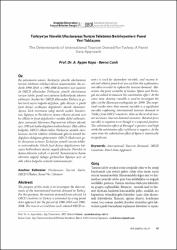| dc.contributor.author | Kaya, A. Ayşen | |
| dc.contributor.author | Canlı, Berna | |
| dc.date.accessioned | 2014-07-10T06:30:20Z | |
| dc.date.available | 2014-07-10T06:30:20Z | |
| dc.date.issued | 2013 | |
| dc.identifier.issn | 13030876 | |
| dc.identifier.uri | https://hdl.handle.net/11421/107 | |
| dc.description.abstract | Bu çalışmanın amacı, Türkiye’ye yönelik uluslararası turizm talebinin belirleyicilerini araştırmaktır. Bu nedenle 1990-2010 ve 1990-2008 dönemleri için seçilmiş 24 OECD ülkesinden Türkiye’ye yönelik uluslararası turizm talebi, panel veri yöntemi kullanılarak tahmin edilmiştir. Seçilen her OECD ülkesinden Türkiye’ye gelen turist sayısı bağımlı değişken, gelir düzeyi ve göreli fiyat düzeyi açıklayıcı değişkenler olarak alınmıştır. Ayrıca Türk turizmine rakip olarak seçilen Yunanistan, İspanya ve Portekiz’in ikame etkisini ölçmek için bu ülkelerin fiyat değişkenleri modele dahil edilmiştir. Aynı zamanda Marmara Depremi’ nin etkisini ölçmek için 1999 yılı kukla değişkeni kullanılmıştır. Elde edilen bulgular, OECD ülkelerinden Türkiye’ye yönelik uluslararası turizm talebini belirlemede gelirin önemli bir değişken olduğunu göstermiştir. OECD ülkelerinin gelir düzeyinin artması Türkiye’ye yönelik turizm talebini artırmaktadır. Göreli fiyat düzeyi değişkeninin katsayısı beklenilenin aksine negatif çıkmıştır. Portekiz‘in ikame etkisinin yüksek ve pozitif, Yunanistan’ ın ikame etkisinin negatif olduğu gözlenirken İspanya için ise elde edilen bulgular anlamlı bulunmamıştır. | en_US |
| dc.description.abstract | The purpose of this study is to investigate the determinants of the international tourism demand to Turkey. For this purpose, the tourism demand from selected 24 OECD countries to Turkey is estimated by using panel data approach for the period of 1990-2010 and 1990-2008. The tourist arrival from each selected OECD country is used for dependent variable, and income level and relative price level are used for the explanatory variables in order to explain the tourism demand. Moreover, the price variables of Greece, Spain and Portugal are added to measure the substitution effect. At the same time, dummy variable is used to investigate the effect of the Marmara earthquake for 1999. The empirical results show that income variable is a significant variable explaining international tourism demand to Turkey from OECD countries. Also, as the level of income increases, tourism demand increases. Relative price variable is negative even though it is expected positive. The substitution effect of Portugal is positive and high while the substitution effect of Greece is negative. At the same time the substitution effect of Spain is statistically insignificant. | en_US |
| dc.language.iso | tur | en_US |
| dc.publisher | Anadolu Üniversitesi | en_US |
| dc.rights | info:eu-repo/semantics/openAccess | en_US |
| dc.subject | Uluslararası Turizm Talebi | en_US |
| dc.subject | OECD Ülkeleri | en_US |
| dc.subject | Panel Veri Yöntemi | en_US |
| dc.subject | International Tourism Demand | en_US |
| dc.subject | OECD Countries, | en_US |
| dc.subject | Panel Data Approach | en_US |
| dc.title | Türkiye’ye Yönelik UluslararasıçTurizm Talebinin Belirleyenleri: Panel Veri Yaklaşımı | en_US |
| dc.title.alternative | The Determinants of International Tourism Demad For Turkey: A Panel Data Approach | en_US |
| dc.type | article | en_US |
| dc.relation.journal | Anadolu Üniversitesi Sosyal Bilimler Dergisi | en_US |
| dc.relation.publicationcategory | Makale - Uluslararası Hakemli Dergi - Kategorisiz | en_US |


















